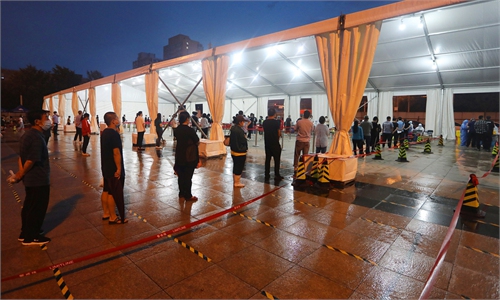
Cover of Dr. Zha's Diary of Fighting the COVID-19 Photo: Courtesy of Renji Hospital
Chinese doctor Zha Qiongfang's new book provides an in-depth look at what it was like to be on the frontlines during the worst of the coronavirus epidemic in Central China's Hubei. Her diary has now been translated into English and is now on pre-sale around the world. The author told the Global Times how her training helped her to keep going even after losing a patient.
Zha is a respiratory physician from Renji Hospital, Shanghai Jiaotong University School of Medicine, and a member of the first 135-person medical team that departed Shanghai for Wuhan on January 24, China's lunar new year's eve - the country's biggest holiday -- and didn't return to Shanghai until March 31 after the coronavirus subsided in Wuhan.
The book consists of 67 diary enters presenting the evolution of the COVID-19 epidemic in Wuhan during the 68 days of the medical team's stay in the city as it progressed into a city full of hope.
The whole atmosphere in the city was down and depressed when her team first arrived, Zha said. There were hardly anyone on the roads when they arrived. Some patients were worried and anxious about their illness and future. Many people she met wore serious expressions either because of fear of the virus or being fatigued from fighting it.
But things slowly changed. "At the very beginning, all the beds in our wards were occupied, and we had patients coming in all the time," she said. "But before we left, there were only two patients in our wards, and they were recovering."
More people and vehicles appeared on the roads, cherry blossoms started to bloom in early March and some companies, restaurants and shops resumed operation on March 23, Zha added.
"I would like to present what we did and what we saw in Wuhan, something that really happened in the city," Zha told the Global Times.

Zha Qiongfang Photo: Courtesy of interviewee
For her, the book is also a note of the changes in the psychological condition of medical workers, from nervous and depressed to relaxed and optimistic.
Before setting off to Wuhan, Zha was nervous about an uncertain future as she didn't know what was waiting for her, what she was supposed to do, and where she was to be assigned in Wuhan, she told the Global Times.
It took them three weeks to get used to the situation in the hospital, where she and some of her team were assigned to take over intensive care wards in Jinyintan Hospital of Wuhan. The team's confidence was tested by various conditions, including the complicated self-protection procedures, failures in patient treatment, and different computer systems.
Things finally started to run smoothly with support from experts back in Shanghai, and counterparts in Wuhan hospitals who shared their experiences, Zha said.
The main tone of the diaries, is peaceful and positive. Zha explained this is partly due to her training as a physician, which requires her to stay rational and clear. There were some depressing moment, especially when some patients died, she said, but she had to pull herself up as soon as possible to continue the fight.
She also noted that when she first started writing the diary, she was just trying to record her daily work and also used writing as a way to relieve her stress. She wanted to let people know that she and her colleges were coping with the situation in Wuhan, with so much support from others.
In her dairies, Zha recorded not only the experiences of medical staff but other people's stories too. There were the drivers who drove them to and from their hotel and the hospital every day, the patient who volunteered to clean the ward after recovering from the disease, the chefs who cooked Shanghai cuisine for them, and the families who donated the bodies of their deceased relatives for coronavirus research.
"They are all ordinary people. That's just because there are so many ordinary people who are trying their best to do something, that we could have get the pandemic under control in such a short period," Zha said. "Greatness is built out of the ordinary."



